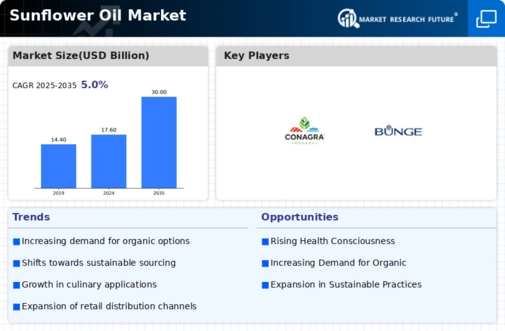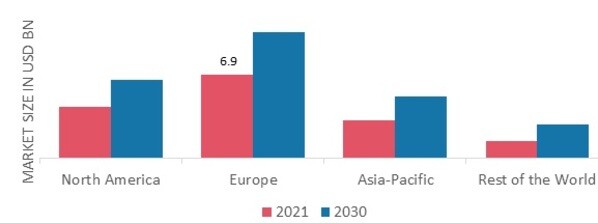Market Trends
Introduction
By 2022, the sunflower oil market is experiencing significant changes, resulting from a combination of macro-economic factors, such as technological developments, regulatory changes, and changing consumer preferences. The development of extraction and processing techniques improves the quality and yield of sunflower oil, while the stricter regulations on food safety and labeling are changing the industry standards. Also, the growing demand for healthier oils and sustainable entrepreneurship is influencing the purchase. These trends are strategically important for market participants as they navigate the competition, adapt to regulatory changes, and align their products with the demand.
Top Trends
-
Sustainability Initiatives
The sunflower oil industry is increasingly focused on sustainable practices, and major players are committing to eco-friendly sourcing. Among other things, companies are adopting certifications like RSPO to ensure the responsible production of palm oil. It is driven by the growing demand for transparency from consumers, with 66% willing to pay more for sustainable products. As regulations become stricter, those who focus on sustainable practices may have a competitive advantage. -
Health-Conscious Consumerism
In the case of a good sunflower oil, there is a trend towards health-oriented products, in which the unsaturated fats and the low trans-fats are dominant. In addition, the sunflower oil is rich in vitamin E, which is an advantage for health-conscious consumers. There is a launch of fortified products, which could lead to an increase in market share of health-oriented brands. Awareness of dietary trends is expected to continue in the future. -
Innovative Packaging Solutions
In the sunflower oil market, a change is taking place towards more sustainable and more sustainable packaging. To reduce the impact on the environment, companies are exploring biodegradable and recyclable materials. Brands that use more sustainable packaging are therefore more popular with consumers. The trend not only improves the brand's image, but also contributes to the global goal of sustainable development, which may also influence consumers' purchasing decisions. -
E-commerce Growth
E-commerce has changed the way sunflower oil is sold. Sales through e-commerce are expanding rapidly. According to the figures, a considerable proportion of purchases of food are made through the Internet, with a significant increase in the purchase of sunflower oil. In order to take advantage of this opportunity, companies are investing in digital marketing strategies, which may result in higher sales and brand loyalty. There may be a further increase in the level of involvement of consumers through the Internet. -
Diversification of Product Offerings
To meet the varied tastes of consumers, companies have diversified their range of sunflower oil products, which now include organic and flavoured varieties. The trend is backed by market research that shows an increasing demand for speciality oils. The result is that companies are able to attract niche markets and increase customer loyalty. Competition for the market among the brands will intensify as a result. -
Global Supply Chain Resilience
The sunflower oil industry is working to build up a supply chain that is resistant to disruptions caused by global events. The industry is investing in local sourcing and production to reduce the risk of disruptions. The figures show that disruptions in the supply chain have caused prices to rise, which has prompted the industry to adapt. Future developments may include stronger cooperation and more technological investment in order to increase the efficiency of the supply chain. -
Consumer Education and Awareness
Among the advantages of sunflower oil, its beneficial properties and culinary qualities are becoming increasingly known. The leading companies are launching campaigns to inform consumers. Research shows that informed consumers are more likely to choose sunflower oil. This could lead to an increase in demand and the growth of the market as awareness increases. Future initiatives may focus more on digital platforms in order to reach a wider audience. -
Regulatory Compliance and Standards
The sunflower oil market is increasingly influenced by compliance with food safety regulations. Governments are imposing stricter labeling and quality regulations, requiring companies to tighten their own compliance activities. In our experience, non-compliance can result in significant fines and can affect brand reputation. In the future, stricter regulations may drive companies to invest in quality assurance. -
Emerging Markets Expansion
Developing countries are becoming the main growth markets for sunflower oil, thanks to a rise in purchasing power and changing dietary habits. Data shows that consumption of sunflower oil is increasing in countries such as India and Brazil. This trend offers opportunities for expansion and greater sales. Local production could meet local demand. -
Technological Advancements in Production
Technological progress in the production of sunflower oil is increasing its efficiency and quality. In the extraction of oil, the companies use new extraction and refining methods to increase the yield and reduce the losses. These studies indicate that these innovations can lead to savings and better quality of the product. There will be further automation and digitalization of production processes and the efficiency of the process.
Conclusion: Navigating the Sunflower Oil Landscape
The sunflower oil market in 2022 is characterized by a very high level of competition and considerable fragmentation, with both established and new players competing for market share. Moreover, the regional trends in terms of consumers’ preference for sustainable products are causing the sellers to reorient their strategies. The established companies are relying on the distribution network and brand loyalty to achieve a high market share, while the new companies are focusing on innovation and agility to gain a foothold in the niche markets. The ability to integrate advanced capabilities, such as the use of artificial intelligence for forecasting, automation for operational efficiency, and a commitment to sustainability, will be crucial for market leadership. The evolving nature of the market means that the sellers will have to be flexible in order to respond to the changing preferences of consumers and the changing competitive environment.






Leave a Comment